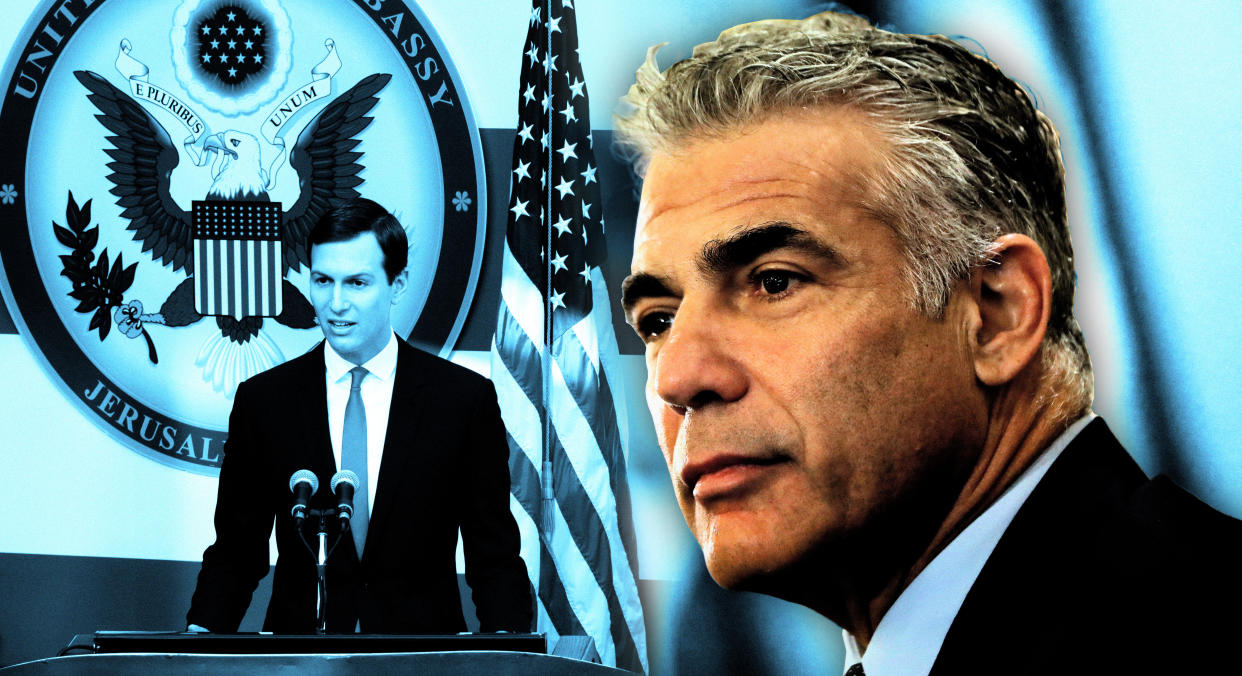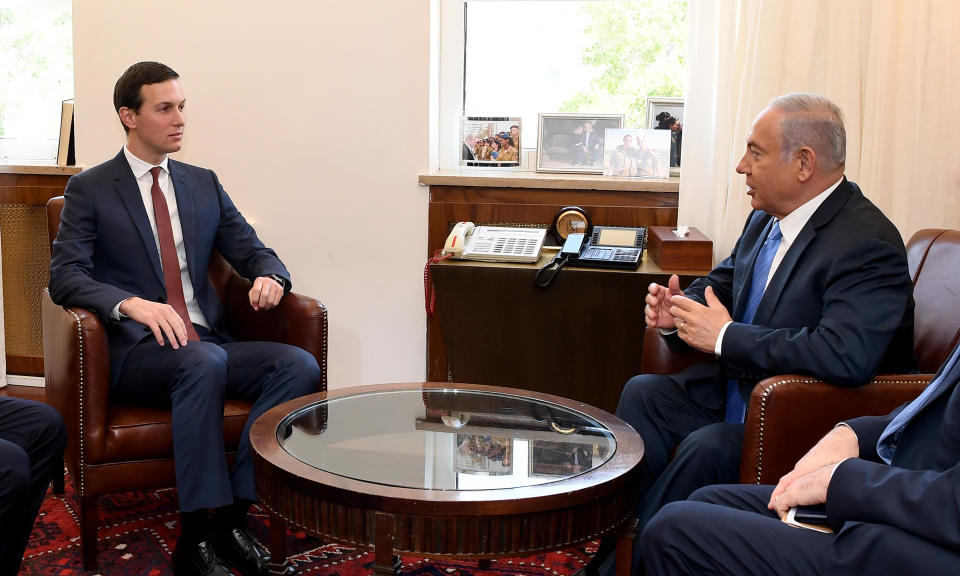Leading Israeli liberal praises Kushner’s unfinished, still-secret Mideast peace plan

WASHINGTON — In 2013, Yair Lapid was deemed the most influential Jew in the world by the Jerusalem Post. The former actor had started a centrist liberal political party, Yesh Atid, that had ambitions to rescue Israel from its bloody, decades-long struggle with a stateless Palestinian people. As a sign of his growing clout, the then 49-year-old Lapid was appointed finance minister by Prime Minister Benjamin Netanyahu — even as it was clear that Lapid wanted to climb much higher than that.
The following year, Lapid took part in what he recalls was the 11th bilateral meeting between the Israelis and Palestinians since the 1993 Oslo Accords, which enjoined both parties to work peacefully towards the creation of a Palestinian state. The talks left Lapid deeply disenchanted, he said in a talk at the Brookings Institution, a liberal think tank in Washington, D.C., on Monday morning.
“These were tired people telling each other the same tiring things that they had for twenty years,” he remembered during an hour-long talk about Israel’s future. “Just people talking for the sake of talking.”
By contrast, Lapid — today one of the most prominent opposition politicians in Israel as head of Yesh Atid — offered cautious advance praise for the Middle East peace plan being developed by White House adviser Jared Kushner. Details of the plan have not been made public, and Lapid hasn’t seen it, but Kushner was recently in Israel, where he held talks with Netanyahu. Among the topics discussed was the deteriorating humanitarian situation in the Gaza Strip. Kushner also gave an interview to the Palestinian newspaper Al Quds in which he harshly criticized Palestinian President Mahmoud Abbas for either an unwillingness or inability to negotiate in good faith.

According to a March report in the New York Times, the plan “will not call for a two-state solution as one of its goals, though it will prescribe pathways for the creation of two states. Nor will it call for a ‘fair and just solution’ for Palestinian refugees, though it will offer steps to deal with the issue of refugees.”
Lapid seemed to suggest that the Trump administration was more engaged in the peace process than was President Barack Obama’s foreign policy team, led by Secretary of State John Kerry. “Nobody was using the words ‘peace plan’ for quite a while now,” Lapid said, describing a “slow decline” of fruitful negotiations, in what appeared to be a veiled criticism of Kerry.
Kerry, for his part, has blamed Israel for an unwillingness to seriously grapple with the challenge of creating a Palestinian state while preserving a Jewish one.
“This is coming back to the language of the two-state solution,” Lapid said of Kushner’s plan, even if that solution will prove, this time around, far friendlier to Israel than previous iterations. Palestinian leaders have treated the Trump administration with a suspicion that could frustrate any efforts at a lasting peace.
Israelis have their own reservations. When pressed by moderator Tamara Cofman Wittes, who heads the Middle East program at Brookings, about whether Israel would allow a Palestinian capital in East Jerusalem, Lapid bristled, suggesting this would be tantamount to ceding half of Washington to Mexico. “The question right now is not how they’re gonna draw lines on the map. It’s how to create the mechanism and dynamics of negotiating,” Lapid said. He also blamed liberal Israelis for opening negotiations by offering possible concessions in advance. “This is not the way to negotiate in the Middle East,” he warned.
Disagreements over borders, the right of Palestinian refugees to return and the existence of Israeli settlements in the West Bank have doomed previous efforts at peace, including aggressive bids by President Bill Clinton and President George W. Bush.

Lapid’s support of the Kushner plan underscores his own rightward shift. That may be a purely political ploy, one aimed at eventually dislodging Netanyahu. More notable is the fact that young Israeli Jews are both more religious and more nationalistic than their elders. A 2016 poll, for example, found that 48 percent of Jewish high school students in Israel did not believe that Israeli Arabs should be allowed to vote, a right they now have.
At the same time, Lapid expressed some concern that Israel was becoming too closely tied to the Republican Party, which is funded in part by wealthy Jewish donors like casino magnate Sheldon Adelson. He noted that not one Democratic legislator attended last month’s ceremony marking the move of the American embassy from Tel Aviv to Jerusalem. That evening, Lapid called his friend Ted Deutch, Democrat of Florida, and asked him why he hadn’t been present at the ceremony, since he’d been supportive of moving the embassy. Deutch told him that he’d reached out to the administration for an invitation, but no one returned his call.
Lapid offered praise for Kushner’s efforts to improve the situation in Gaza, where the terrorist group Hamas rules a beleaguered, impoverished populace. While any such effort may be ancillary to a peace deal involving the larger number of Palestinians living under Israeli rule on the West Bank, Lapid said it was crucial nevertheless: “We need to deal with the humanitarian crisis in Gaza regardless of what Hamas is doing, and we need to be tough on Hamas regardless of the humanitarian crisis,” he said.
He noted that Gaza’s bombed-out infrastructure has led to sewage spilling incessantly into the Mediterranean Sea (some 100,000 cubic meters of “raw or partially treated sewage” each day, according to The Washington Post). That has led to the closure of the beaches at Ashkelon, a town just north of the Gaza Strip. Ashkelon also happens to be the location of Israel’s Sorek desalination plant, which supplies about a fifth of the nation’s drinking water. That meant, Lapid joked grimly, that Israelis were drinking Palestinian sewage.
“It’s time to move forward,” he said. “It’s time for Israel 2.0.”
_____
Read more from Yahoo News:
Stephen Miller, meet your great-grandfather, who flunked his naturalization test
From the ‘Northern Triangle’ to the Rio Grande: Violence, poverty and disasters drive migration
The dominance game, as played by dictators and other animals
With DACA phasing out, college graduates face an uncertain future
Photos: Patrolling the border, where immigrants wait to be caught



